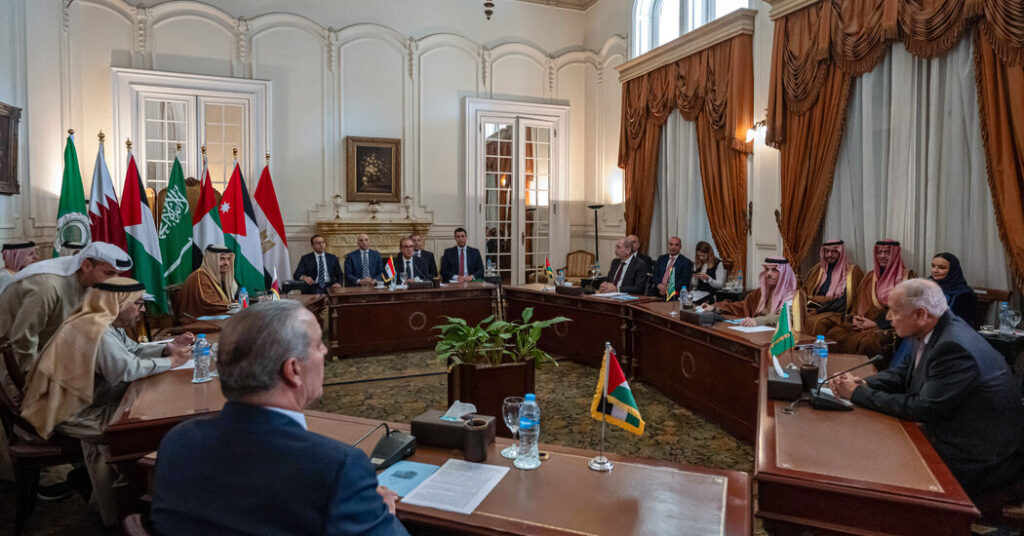A broad group of Arab nations on Saturday rejected an idea floated by President Trump for Gazans to be moved to Egypt and Jordan, saying in a joint statement that such a plan risked further expanding the conflict in the Middle East.
The statement, signed by Egypt, Jordan, Saudi Arabia and other Arab countries, did not refer to Mr. Trump’s comments explicitly but warned that any plan that encouraged the “transfer or uprooting of Palestinians from their land” would threaten stability in the region and “undermine the chances of peace and coexistence among its people.”
In recent days, Mr. Trump has suggested on multiple occasions that Gazans should be evacuated from the enclave en masse and taken in by Jordan and Egypt. The far right in Israel has made similar calls for Palestinians to leave the territory.
“You’re talking about probably a million and a half people, and we just clean out that whole thing,” Mr. Trump said of Gaza last weekend. “I don’t know. Something has to happen, but it’s literally a demolition site right now.”
He said Palestinians could be in Jordan and Egypt “temporarily, or could be long-term.” It was unclear from Mr. Trump’s comments whether he was suggesting that the entire population of Gaza — more than two million people — should leave.
For Palestinians, even the suggestion of such a mass exile evokes painful historical memories: Hundreds of thousands of Palestinians were displaced to neighboring countries during the war surrounding Israel’s 1948 establishment. After they left, Israel did not allow them to return and many are still formally considered refugees.
Egypt and Jordan immediately spurned Mr. Trump’s call. Both countries have longstanding peace treaties with Israel and support a Palestinian state but also fear that a large influx of Palestinians who would remain indefinitely could stir domestic upheaval.
The statement on Saturday was a notable show of unity from across the Arab world. The United Arab Emirates, Qatar, the Palestinian Authority and the Arab League also signed onto the statement, which came after a meeting of foreign ministers in Cairo.
The statement said that the countries looked forward to working with the Trump administration “to achieve a just and comprehensive peace in the Middle East, in accordance with the two-state solution.”
During his previous administration, Mr. Trump submitted a plan that Palestinians said fell far short of giving them a truly independent state. It is still unclear what he may seek to advance during his current term and what his long-term visions for Gaza and the Israeli-occupied West Bank are.
The Trump administration has appeared eager to engage with the Gulf powerhouses of Saudi Arabia and the United Arab Emirates after the president enjoyed mostly friendly relations with both in his first term.
But Mr. Trump’s stance on Gaza could complicate those efforts.
His administration seeks to broker a wider Middle East peace agreement that would include normalizing diplomatic relations between Israel and Saudi Arabia, a deal that Mr. Trump sought during his first term.
But the war in Gaza, in response to the Hamas-led attack of Oct. 7, 2023, has prompted major shifts in the region.
Widespread anger over the war, which has killed tens of thousands of people and wreaked vast destruction and displacement of the population, has renewed attention on the issue of Palestinian statehood.
Saudi Arabia’s leader, Crown Prince Mohammed bin Salman, has said his country will not establish diplomatic relations with Israel without a Palestinian state.
Millions of Palestinian refugees are already living in camps in Jordan, Syria and Lebanon while others are living in Egypt and the United Arab Emirates. Egypt has also allowed more than 100,000 Gazans to cross into its territory since the war began in October 2023.
On Friday, a small group of Egyptians demonstrated on their side of the Rafah border crossing with Gaza as part of a protest against Palestinian displacement from Gaza. Rallies in autocratic Egypt are almost always staged or sponsored by the authorities.
Egypt and Jordan are both significant U.S. partners in the Middle East, and the U.S. government has typically seen their stability as key to the wider region. They both receive considerable U.S. funding. Egypt is the second-largest recipient of foreign aid after Israel.


